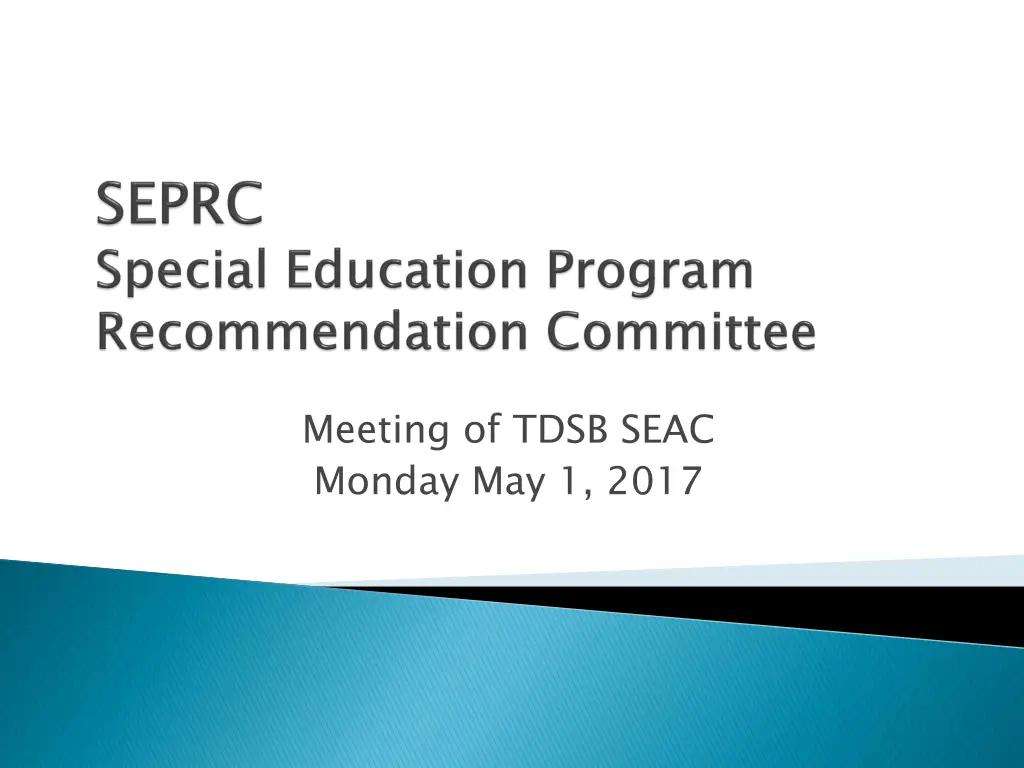
TDSB Special Education Process
Learn about the TDSB Special Education Advisory Committee (SEAC) meetings, Individual Placement and Review Committee (IPRC) process, and how parents/guardians can initiate discussions for students with special needs. Understand the roles of key members in the SEPRC meetings and the purpose of these meetings in determining the need for an Intensive Support Program (ISP) for students.
Download Presentation

Please find below an Image/Link to download the presentation.
The content on the website is provided AS IS for your information and personal use only. It may not be sold, licensed, or shared on other websites without obtaining consent from the author. If you encounter any issues during the download, it is possible that the publisher has removed the file from their server.
You are allowed to download the files provided on this website for personal or commercial use, subject to the condition that they are used lawfully. All files are the property of their respective owners.
The content on the website is provided AS IS for your information and personal use only. It may not be sold, licensed, or shared on other websites without obtaining consent from the author.
E N D
Presentation Transcript
Meeting of TDSB SEAC Monday May 1, 2017
IPRCs prior to January 2012 held for non- TDSB students Under the Education Act and Regulations, IPRC process intended to apply only to pupils of the school board TDSB had no jurisdiction to make IPRC decisions for students not enrolled On the advice of legal counsel, decision was made to adhere to the regulation in all future proceedings
To continue to provide a forum for discussion of non-TDSB students with significant special needs prior to enrolment in our board To provide an opportunity to involve those who can speak to the child s background and learning experiences to date Ultimately to determine whether a student may require an intensive support program (ISP) upon enrolment * A change of process, not viewpoint
Parents/guardians visit home school and begin conversation about their child with special needs Principal requests relevant documentation about the child Principal then consults with members of the School Support Team (SST) to determine if a SEPRC meeting is appropriate Generally SEPRCs are for students with a profile suggesting that needs could not be addressed adequately in the home school, with special education supports, for even a short period of time If appropriate, a referral is prepared for the Special Education Department
3 members Principal (Chair) Special Education Coordinator Representative of Psychological Services Same membership as an IPRC Relies on documentation provided in advance as well as information provided at the meeting Makes recommendations vs decisions Discusses programs and services
Attended by school principal and relevant staff, parents/guardians, representatives from current program or agency, supporters Presentation is made to the SEPRC Principal/staff provides overview of student s background, presenting areas of strength/need, academic or skill levels, support in current program Parents/guardians/agency representatives provide more in-depth details and outline additional information Psychology representative highlights and interprets any professional reports Questions for clarification are encouraged
Determination is made by the SEPRC if the student requires an ISP Where a recommendation for an ISP is made the Psychology representative determines whether the student meets TDSB exceptionality criteria in order to assist the teacher with appropriate programming strategies If an ISP is not recommended the student is referred back to the home school and the special education resources available there
Record of the meeting Student s areas of strength and need are noted Indication of a recommendation for a Special Education ISP may be included Where a recommendation for an ISP is made a notation is made should the student meet TDSB exceptionality criteria Committee members and attendees are noted Area for parent/guardian signature and comments is available
A SEPRC recommendation may be deferred until a later date, e.g., a new professional report is pending A new meeting is scheduled once the reason for the deferral has been addressed Meeting proceeds only if parents/guardians attend If they don t attend and the student does not enrol in a TDSB school, all documentation associated with the SEPRC referral is destroyed
Where an ISP is recommended parents/guardians may indicate their decision at the meeting or take the form away for further consideration If parents/guardians accept the recommendation for an ISP the Special Education Department prepares a program offer and arrangements are made for a visit to the school hosting the program Parents/guardians may or may not accept the offer If parents/guardians do not accept the offer, the student may enrol in the home school with the special education resources available there
Where parents/guardians accept an ISP it is important to re-visit the program recommendation after the student has been in the program for a period of 6 to 9 months SEPRCs are tracked so that follow-up IPRCs can be planned where appropriate The student is presented to an SST where a decision may be made to refer the student to an IPRC The SEPRC and IPRC processes are sequential
The purpose of the IPRC is to determine whether a student is exceptional by meeting criteria established by the Ministry of Education and the TDSB The IPRC makes a placement decision for students deemed exceptional regular class or special education class Decisions of the IPRC may be appealed, unlike SEPRC recommendations
A SEPRC meeting is not mandatory A SEPRC meeting is principal-initiated only, upon the recommendation of the SST Parents/guardians proceed only if they are comfortable with the process When parents agree to participate in a SEPRC, they do not forgo their right to request an IPRC once their child is attending a TDSB school Since students are not yet attending a school under the jurisdiction of the TDSB, there is no formal appeal process to the TDSB of recommendations made at the SEPRC
